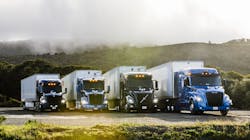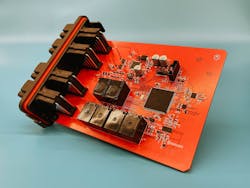Embark standardizes self-driving tech for major truck OEMs
Autonomous truck developer Embark launched the Embark Universal Interface (EUI), a set of standardized self-driving components and the flexible interfaces necessary for major truck OEMs to more easily and robustly integrate Embark's autonomous technology onto their vehicle platforms. This includes Freightliner, International, Peterbilt, and Volvo trucks.
"We absolutely believe that integrating with OEMs is the path to market for self-driving trucks," said Alex Rodrigues, co-founder and chief executive officer of Embark. "We also believe that being cross-compatible and easy to integrate into all OEM's vehicles as their level 4 platforms continue to develop gives us a competitive advantage."
The EUI integration focused on the intersection of four OEM’s platform specifications, instead of designing to one. Embark, founded in 2016, is building the industry's first universal system that is intentionally designed to integrate into any platform. Embark said designing its system from the beginning to work across platforms required an “immense amount of upfront investment and thoughtfulness around cross-platform trade-offs. The EUI effort is the manifestation of this philosophy into a product.”
While certain self-driving startups have partnered directly with OEMs, Embark tailored its approach to the trucking industry’s practice of offering trucks with key components sourced from multiple suppliers, including engines, transmissions, and braking systems, in response to carrier demand. Embark believes their rapid integration “will provide OEMs with autonomous technology that is most responsive to their carrier customers' needs.”
The EUI achieves its universality through a two-part design. Part one consists of a standardized components package – sensors and compute system – which have been determined through thousands of hours of design, testing, and analysis. Between these standardized components and the truck is part two of the EUI design, a set of physical, electrical, and software interfaces that enable the standardized components package to connect to and communicate with any OEM platform's steering, braking, throttle, telematics, power, chassis, and HVAC.
At the center of the interface package is the Embark Gateway, an automotive-grade ECU developed by Embark to enable API communication between Embark's technology and any OEM platform.
Embark's long-term vision is for OEMs to integrate Embark's technology with their truck platforms, which the OEMs will then sell with the maintenance and warranty support carriers demand. Embark supports this model and undertook the EUI effort to accelerate this process. The benefits of the program for Embark and the freight ecosystem manifest themselves in both the short-term and long-term.
The EUI program also enables Embark to grow its test fleet across the four major OEM brands, increasing Embark's truck count and fleet diversity and improve the fidelity of its test program and accelerate deployment.
"The launch of EUI opens the door to a much larger market opportunity for Embark by making their self-driving technology platform-agnostic," said Pat Grady, Partner at Sequoia Capital. "We've seen time and time again how the emergence of an open platform can serve as a galvanizing force in fast-developing markets, and this breakthrough technology from Embark has a chance to do the same for what's historically been a complex and fragmented industry. This is a huge step forward both for Embark and for the entire trucking industry."
In the long run, Embark envisions the EUI program will generate novel learnings around standardized sensor placement, vehicle communication protocols, telematics standardization, power management, and many other areas, a swell as make integration at the OEM more efficient and robust. This should all lead to more fleets able to test the self-driving tech and validate its performance, independent of which truck makes they operate.
"We currently purchase trucks from multiple OEMs and plan to continue this strategy to optimize the experience for our drivers and meet our Total Cost of Ownership objectives," said Trevor Fridfinnson, Chief Operating Officer at Bison Transport. "Embark's investment to integrate its autonomous driving system with the major OEMs will allow us to test and deploy autonomous trucking capabilities without introducing a new OEM into our fleet for that sole purpose."

